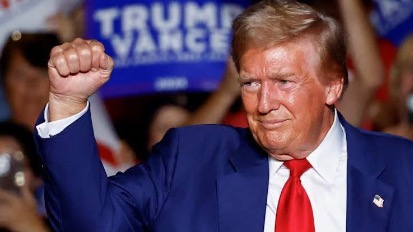International relations experts, including Prof. Anthony Kila, Director of the Centre for International Advanced Professional Studies (CIAPS) in Lagos, and Ambassador Victor Asije, Special Emissary on Media to Nigeria for the International Society of Diplomats (ISD), have shared insights with Sunday Independent on the implications of Donald Trump’s historic return as U.S. President. Trump’s comeback, announced on Wednesday, comes four years after he was voted out of the White House.
Discussing the potential impact on undocumented immigrants, particularly Nigerians and other Africans, Prof. Kila remarked: “Donald Trump was very clear about his intention to do mass deportation; he tagged it the biggest deportation in the history of America, and his very clear victory gives him the mandate to do just that.” He emphasized that it’s logical to expect Trump to proceed with plans for the deportation of undocumented immigrants.
Prof. Kila advised families with undocumented relatives in the U.S. to begin preparing for their potential return to Nigeria. He noted, however, that while the expectation of mass deportation is logical, Trump’s unpredictable nature might alter these plans once he assumes office. “Donald Trump is a difficult-to-predict person, politician, and personality; he might get power and not do the massive deportation he promised,” Kila added.
Regarding what Nigeria could potentially gain from Trump’s presidency, Kila noted that if Trump adheres to his campaign rhetoric, there might be little for Nigeria to benefit. He explained that Trump’s policies appear insular, focusing less on developing countries. “Nigeria as a country will have little to gain from his administration because he has not positioned himself as friendly to, or interested in, developing countries,” Kila stated.
Despite this, Kila pointed out that individual Nigerians play significant roles within the U.S. system, contributing in ways that cannot be easily dismissed. He added: “There are fears that Nigerians (and other immigrants) in America might be discriminated against, but I think the Constitution will defend them.”
On the potential impact of Trump’s presidency on U.S.-Nigeria diplomatic relations, Kila suggested that the relationship would likely be driven by business interests rather than diplomatic sensitivity to African nations. “Donald Trump is neither sensitive to developing countries, nor is he a friend of Africa. His administration’s relations will be defined by clear interests, largely determined by business figures around him,” he concluded.
Ambassador Victor Asije shared a similar perspective, urging Nigerians and Africans to avoid self-victimization in light of Trump’s campaign promises. Asije emphasized that Trump’s policies are not specifically targeted at Africans or Nigerians but are part of broader foreign policy plans. He said: “Africans and Nigerians, especially the undocumented immigrants, should understand that national governments, including Trump’s incoming administration, have established foreign policies.”
Asije advised undocumented immigrants to focus on securing proper documentation in the U.S., expressing optimism that Trump’s administration would not exhibit prejudice against those who follow the legal process. “With the necessary documentation, Trump would not be prejudiced, biased, or discriminate against Africans and Nigerians,” he asserted.
The Ambassador highlighted the importance of adhering to the policies already outlined by Trump and the Republican Party. He concluded that all residents and visitors in the U.S. must comply with the administration’s policy directions, which have been meticulously planned and will be enforced.



